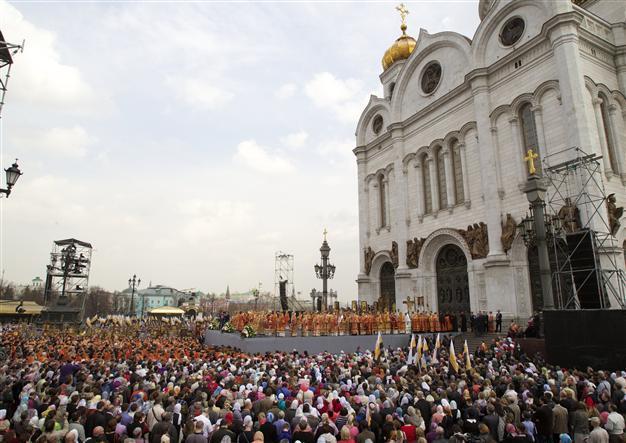Tens of thousands pray for Russia's church
MOSCOW - The Associated Press

Russian Orthodox believers pray outside the Christ the Savior Cathedral in Moscow, Russia, Sunday, April 22, 2012. AP photo
Tens of thousands prayed outside Moscow's main cathedral on Sunday to show their support for the Russian Orthodox Church in a controversy over a punk rock political protest.Christ the Savior Cathedral was the scene of a brief surprise performance in February by a female punk rock group protesting Vladimir Putin's return to the presidency. Three members of the band Pussy Riot remain in police custody and face up to seven years in jail on charges of hooliganism.
Their harsh treatment has provoked a public outcry and contributed to growing criticism of the church, a powerful institution with close ties to the Kremlin.
Patriarch Kirill has portrayed the punk performance as part of a broader attack on the church, considered by many Russians to be part of their national identity and an intrinsic part of a powerful state.
He had called on believers to attend Sunday's service to pray "for our faith, our church, our sacred objects and our fatherland." The church maintains that desecration of icons and other acts of vandalism have become more frequent since the punk protest. As the patriarch led a procession around the cathedral, priests carried a crucifix and an icon that had been damaged in attacks elsewhere in Russia this spring.
The priests also carried an icon that had been riddled with bullet holes in the 1920s, when atheist Communists began destroying churches around the country after taking power in 1917.
Speaking to the crowds from a stage outside the cathedral, Kirill said the church once again has come under attack from "enemy forces." "We have gathered to stand before God and to pray for our people, for our youth, so that our Lord will deliver them from temptation," the patriarch said.
The patriarch has joined the Kremlin in portraying the anti-Putin protest movement as a threat to Russian statehood. The protests drew tens of thousands onto the streets of Moscow in the months head of the March presidential election that gave Putin a third presidential term.
















